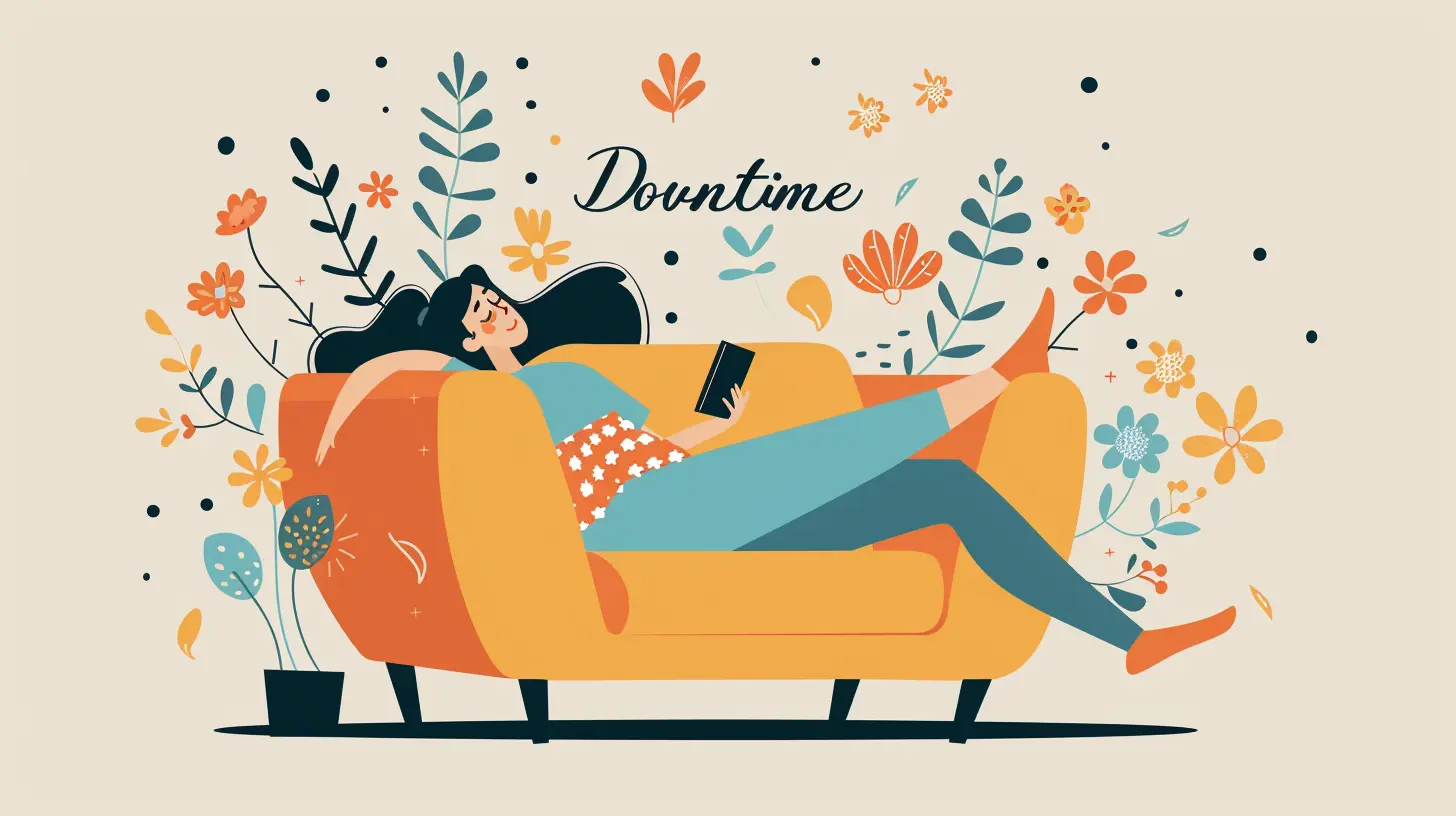Redefining “Downtime”: Finding Non-Digital Ways to Relax
7 May 2025
In today’s fast-paced world, our version of “downtime” often involves mindlessly scrolling through our phones, binge-watching TV shows, or playing video games. While these activities may feel like relaxation, they often leave us feeling more drained than refreshed.
But what if we could redefine how we unwind? Instead of relying on screens, we can embrace non-digital ways to relax—ones that truly recharge our minds and bodies. Let’s dive into meaningful ways we can unplug and find genuine rest.

Why Screen-Based Relaxation Isn’t Always Effective
After a long day, reaching for your phone or tablet may seem like the easiest way to unwind. The problem? Excessive screen time can actually increase stress, disrupt sleep, and make it harder to focus.Ever noticed how an hour on social media somehow vanishes, leaving you feeling groggy instead of refreshed? This happens because our brains remain overstimulated, even when we think we’re “relaxing.” Instead of passive screen consumption, our bodies and minds crave intentional, rejuvenating activities.
So, what are some non-digital ways to truly unwind? 
1. Embrace the Power of Nature
Spending time outdoors is one of the simplest yet most effective ways to relax. Whether it’s a short walk, gardening, or simply sitting on your porch, nature has a calming effect on our minds.Benefits of Outdoor Time
- Reduces Stress: Fresh air and natural surroundings lower cortisol levels.- Boosts Creativity: Being outside stimulates problem-solving and inspiration.
- Improves Mood: Exposure to sunlight helps regulate serotonin, making you feel happier.
Next time you feel overwhelmed, step outside for a few minutes. You’d be surprised how much difference fresh air and a little greenery can make. 
2. Read a Physical Book
Remember the joy of holding a book, flipping through its pages, and getting lost in a story? Unlike reading on screens, physical books engage your senses without the eye strain or distractions of notifications.Why Reading Helps You Unwind
- Encourages Deep Focus: No pop-ups or social media distractions.- Reduces Stress: Studies show that even six minutes of reading can lower heart rate and muscle tension.
- Improves Sleep: Unlike screen-based reading, books don’t interfere with melatonin production.
Want a challenge? Set a goal to read at least 10 pages a day before bed. Your mind will thank you. 
3. Practice Mindfulness & Meditation
Mindfulness doesn’t have to be complicated. Simply sitting in silence, focusing on your breath, or practicing gratitude can work wonders for relaxation.Ways to Incorporate Mindfulness
- Deep Breathing Exercises: Inhale for four seconds, hold for four, exhale for four. Repeat until calm.- Body Scanning: Pay attention to tension in different body parts and consciously relax them.
- Gratitude Journaling: Write down three things you’re grateful for every day.
Meditation, even just five minutes a day, trains your mind to slow down, reducing stress and anxiety. And the best part? No Wi-Fi required.
4. Engage in a Creative Hobby
Creativity is one of the best antidotes to stress. It allows you to focus, express yourself, and tap into a state of flow where time just melts away.Non-Digital Hobbies to Try
- Painting or Drawing: Even if you aren’t an artist, playing with colors is therapeutic.- Knitting or Crocheting: The repetitive motion is meditative and relaxing.
- Playing a Musical Instrument: Music triggers relaxation while improving memory and coordination.
- Writing or Journaling: Whether it’s poetry, short stories, or simply jotting down thoughts, putting pen to paper is a great mental escape.
Creativity isn’t about perfection—it’s about the process. So, grab some supplies and start creating!
5. Move Your Body
Exercise isn’t just about staying fit—it’s also a powerful stress reliever. Movement releases endorphins, boosts energy, and promotes better sleep.Relaxing Ways to Move
- Yoga: Gentle stretching combined with breath control eases tension.- Dancing: Put on your favorite song and dance like nobody’s watching.
- Tai Chi: Slow, intentional movements improve balance and reduce stress.
- Evening Walks: Walking without a phone allows your mind to wander and unwind.
The key is to find a form of movement that feels enjoyable, not like a chore.
6. Cook or Bake Something from Scratch
Cooking can be incredibly therapeutic—chopping ingredients, stirring sauces, kneading dough—it’s almost meditative. Plus, it results in a delicious reward.Why Cooking Can Be Relaxing
- Engages the Senses: The smells, textures, and flavors provide a rich sensory experience.- Creates a Sense of Accomplishment: Making something from scratch is rewarding.
- Encourages Mindfulness: Cooking forces you to be present in the moment.
Try making a family meal without distractions. Play some soft music, take your time, and enjoy the process.
7. Connect with Loved Ones (In Person!)
We often underestimate the power of face-to-face interactions. Deep, meaningful conversations with friends or family can be incredibly grounding.Ways to Nurture Relationships Without Screens
- Write a Handwritten Letter to someone instead of texting.- Host a Game Night with board games or card games.
- Have a Picnic in a local park and leave your phone at home.
- Volunteer Together for a cause you care about.
Genuine human connection is far more fulfilling than hours spent scrolling through social media feeds.
8. Try a Tech-Free Evening Routine
Our evening habits can make or break our ability to truly relax. Instead of relying on screens before bed, create a tech-free nighttime routine that signals relaxation.Ideas for a Screen-Free Evening
- Take a Warm Bath: Add some Epsom salts or essential oils for extra relaxation.- Practice Gentle Stretching: Loosening up tight muscles before bed improves sleep quality.
- Listen to Calming Music or Nature Sounds: No screens, just soothing audio.
- Write in a Journal: Reflecting on your day helps clear your mind.
Try unplugging at least an hour before bedtime, and you’ll notice a huge difference in how restful your nights feel.
Final Thoughts
Redefining downtime doesn’t mean eliminating screens altogether—it’s about balancing them with activities that genuinely recharge us. Real relaxation comes from being present, engaging our senses, and nurturing meaningful experiences.Next time you feel the urge to unwind with mindless scrolling, ask yourself: Would this activity leave me feeling refreshed or drained? If it’s the latter, try one of these non-digital ways to relax instead. Your mind and body will thank you!
all images in this post were generated using AI tools
Category:
Limiting Screen TimeAuthor:

Steven McLain
Discussion
rate this article
4 comments
Spencer McBride
Love these ideas! We need more offline time!
May 17, 2025 at 4:05 AM

Steven McLain
Thank you! Embracing offline time can truly enhance our relaxation and reconnect us with ourselves and nature.
Jolene Pace
I love the idea of redefining downtime! In today’s digital age, it’s essential to find non-screen activities that truly refresh us. I’ve started reading more and exploring nature with my kids. These moments not only help us relax but also strengthen our family bonds. Great article!
May 12, 2025 at 4:10 PM

Steven McLain
Thank you for sharing your experience! I'm glad to hear you're finding joy in reading and exploring nature with your kids—those moments are truly invaluable for both relaxation and family bonding.
Lena Myers
I love this! It’s so important to unplug and find joy in simple, non-digital activities. Whether it’s reading, gardening, or just enjoying a cup of tea, these moments can truly recharge our spirits!
May 9, 2025 at 3:48 PM

Steven McLain
Thank you! I completely agree—embracing offline activities is essential for recharging and finding joy in the simple moments.
Lola Snyder
In a world of screens, let silence bloom, Rediscover whispers in the gentle room. With books, with nature, let hearts entwine, In these quiet moments, find peace divine. Downtime redefined, let your spirit shine.
May 7, 2025 at 3:49 AM

Steven McLain
Thank you for capturing the essence of finding peace in quiet moments! Rediscovering nature and books truly enriches our downtime.



